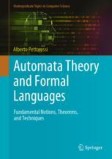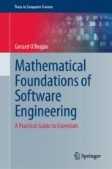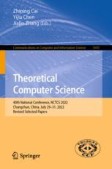Search
Search Results
-
Programming-Based Formal Languages and Automata Theory Design, Implement, Validate, and Prove
This textbook introduces formal languages and automata theory for upper-level undergraduate or beginning graduate students. While it contains the...

-
Automata Theory and Formal Languages Fundamental Notions, Theorems, and Techniques
Knowledge of automata theory and formal languages is crucial for understanding human-computer interaction, as well as for understanding the various...
-
Formal Languages
As underlined by Dutilh Novaes [19, pp. 11–28], when we refer to formal languages, formality corresponds to mainly two properties: asemanticity (in...
-
Regular Languages and Finite Automata
We introduce the notion of a regular language, and show that regular languages are precisely those that are accepted by deterministic finite...
-
Automata Theory and Formal Languages
This chapter is focused on two classes of automata: finite automata and pushdown automata. They accept two classes of languages, respectively:...
-
Automata Classes Accepting Languages Whose Commutative Closure is Regular
The commutative closure operation, which corresponds to the Parikh image, is a natural operation on formal languages occurring in verification and...
-
AutomaTutor: An Educational Mobile App for Teaching Automata Theory
Automata theory is one of the core theories in computer science because it allows scientists and practitioners to understand the complexity of...
-
Automata Theory
This chapter discusses automata theory, including finite-state machines, pushdown automata, and Turing machines. Finite-state machines are abstract...
-
Visit-Bounded Stack Automata
An automaton is k-visit-bounded if during any computation its work tape head visits each tape cell at most k times. In this paper we consider stack...

-
Formal Choreographic Languages
We introduce a meta-model based on formal languages, dubbed formal choreographic languages, to study message-passing systems. Our main motivation is...
-
Performing Regular Operations with 1-Limited Automata
The descriptional complexity of basic operations on regular languages using 1-limited automata, a restricted version of one-tape Turing machines, is...

-
Minimization of Automata for Liveness Languages
While the minimization problem for deterministic Büchi word automata is known to be NP-complete, several fundamental problems around it are still...
-
Weighted Tree Automata with Constraints
The HOM problem, which asks whether the image of a regular tree language under a given tree homomorphism is again regular, is known to be decidable...

-
Formal Grammars and Languages
In this chapter we introduce some basic notions and some notations we will use in the book. In particular, we introduce the notions of a free monoid,...
-
Automata-Based Software Engineering with Event-B
AbstractA new automata-based programming language built by extending the Event-B specification language is proposed. When develo** models in...

-
General-Nondeterministic Fuzzy Pushdown Automata and Their Languages
Inspired by nondeterministic fuzzy finite automata theory proposed by Cao and Ezawa [1], we define general-nondeterministic fuzzy pushdown automata...
-
Formal Languages and the NLP Black Box
The field of natural language processing (NLP) has been transformed in two related ways in recent years.
-
Second-Order Finite Automata
Traditionally, finite automata theory has been used as a framework for the representation of possibly infinite sets of strings. In this work, we...

-
2D Oxide Picture Languages and Their Properties
In the theory of formal languages, two-dimensional (picture) languages are a generalization of string languages to two dimensions. Pictures may be...
-
Theory of reaction automata: a survey
In this paper, we survey on reaction automata theory to model and analyze the biochemical behaviors of vital reactions occurring in nature. Inspired...

